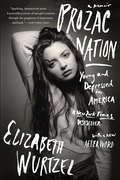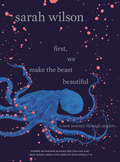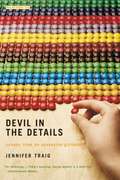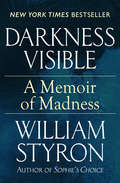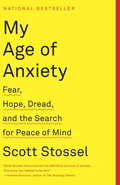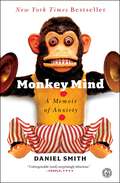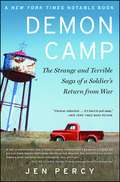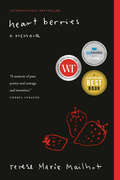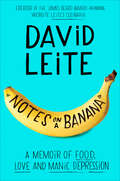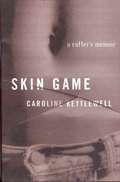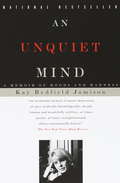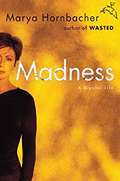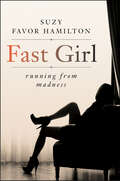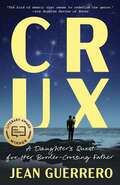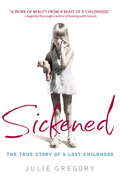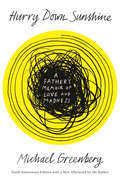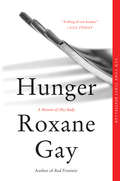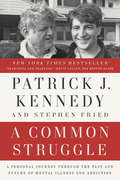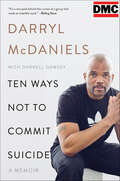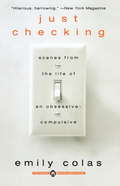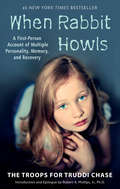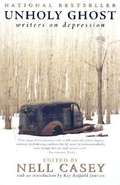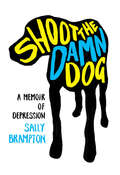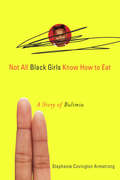Special Collections
Mental Health Month
Description: According to the National Institute of Mental Health, nearly 1 in 5 U.S. adults experience mental illness. In honor of Mental Health Awareness Month, we are highlighting autobiographies in our collection written by authors living with mental illness.
- Table View
- List View
Prozac Nation
by Elizabeth WurtzelIn Prozac Nation, Wurtzel describes her harrowing battle with clinical depression before she was finally treated with Prozac. In a society plagued by divorce, economic instability, and AIDS, Wurtzel depicts the growing number of depressed and overmedicated people in America.
First, We Make the Beast Beautiful
by Sarah WilsonThe New York Times bestselling author of I Quit Sugar transforms cultural perceptions of the mental health issue of our age—anxiety—viewing this widespread condition not as a burdensome affliction but as a powerful spiritual teacher that can deepen our lives.
While reading psychiatrist Kay Redfield Jamison’s groundbreaking account of bipolar disorder An Unquiet Mind, Sarah Wilson discovered an ancient Chinese proverb that would change her life:To conquer a beast, you must first make it beautiful.
Wilson, a bestselling author, journalist, and entrepreneur, had spent years struggling with her own beast: chronic anxiety. And the words of this proverb would become the key to understanding her condition.
First, We Make the Beast Beautiful charts Wilson’s epic journey to make peace with her lifetime companion, and to learn to see it as a guide, rather than as an enemy. With intensive focus and investigatory skills, Wilson examines the triggers and treatments, the fashions and fads. She reads widely and interviews fellow sufferers, mental health experts, philosophers, and even the Dalai Lama, processing all she learns through the prism of her own experiences.
Pulling at the thread of accepted definitions of anxiety, she unravels the notion that it is a difficult, dangerous disease that must be medicated into submission, and re-frames it as a divine journey—a state of yearning that will lead us closer to what really matters.
Practical and poetic, wise and funny, First, We Make the Beast Beautiful is a small book with a big heart. It will encourage the myriad souls who dance with this condition to embrace it as a part of who they are, and to explore the possibilities it offers for a richer, fuller life.
The Collected Schizophrenias
by Esmé Weijun WangAn intimate, moving book written with the immediacy and directness of one who still struggles with the effects of mental and chronic illness, The Collected Schizophrenias cuts right to the core.
Schizophrenia is not a single unifying diagnosis, and Esmé Weijun Wang writes not just to her fellow members of the “collected schizophrenias” but to those who wish to understand it as well.
Opening with the journey toward her diagnosis of schizoaffective disorder, Wang discusses the medical community’s own disagreement about labels and procedures for diagnosing those with mental illness, and then follows an arc that examines the manifestations of schizophrenia in her life.
In essays that range from using fashion to present as high-functioning to the depths of a rare form of psychosis, and from the failures of the higher education system and the dangers of institutionalization to the complexity of compounding factors such as PTSD and Lyme disease, Wang’s analytical eye, honed as a former lab researcher at Stanford, allows her to balance research with personal narrative.
An essay collection of undeniable power, The Collected Schizophrenias dispels misconceptions and provides insight into a condition long misunderstood.
Devil in the Details
by Jennifer TraigDEVIL IN THE DETAILS announces Jennifer Traig as one of the most hilarious writers to emerge in recent yearsand one of the strangest! Recalling the agony of growing up obsessivecompulsive and a religious fanatic, Traig fearlessly confesses the most peculiar behaviorlike tirelessly scrubbing her hands for a full half hour before dinner, feeding her stuffed animals before herself, and washing everything she owned because she thought it was contaminated by pork fumes. The result is a book so relentlessly funny and frank, its totally refreshing.
Darkness Visible
by William StyronThe New York Times–bestselling memoir of crippling depression and the struggle for recovery by the Pulitzer Prize–winning author of Sophie&’s Choice.In the summer of 1985, William Styron became numbed by disaffection, apathy, and despair, unable to speak or walk while caught in the grip of advanced depression. His struggle with the disease culminated in a wave of obsession that nearly drove him to suicide, leading him to seek hospitalization before the dark tide engulfed him. Darkness Visible tells the story of Styron&’s recovery, laying bare the harrowing realities of clinical depression and chronicling his triumph over the disease that had claimed so many great writers before him. His final words are a call for hope to all who suffer from mental illness that it is possible to emerge from even the deepest abyss of despair and &“once again behold the stars.&” This ebook features a new illustrated biography of William Styron, including original letters, rare photos, and never-before-seen documents from the Styron family and the Duke University Archives.
My Age of Anxiety
by Scott StosselA riveting, revelatory, and moving account of the author's struggles with anxiety, and of the history of efforts by scientists, philosophers, and writers to understand the condition
As recently as thirty-five years ago, anxiety did not exist as a diagnostic category. Today, it is the most common form of officially classified mental illness. Scott Stossel gracefully guides us across the terrain of an affliction that is pervasive yet too often misunderstood. Drawing on his own long-standing battle with anxiety, Stossel presents an astonishing history, at once intimate and authoritative, of the efforts to understand the condition from medical, cultural, philosophical, and experiential perspectives.
He ranges from the earliest medical reports of Galen and Hippocrates, through later observations by Robert Burton and Søren Kierkegaard, to the investigations by great nineteenth-century scientists, such as Charles Darwin, William James, and Sigmund Freud, as they began to explore its sources and causes, to the latest research by neuroscientists and geneticists.
Stossel reports on famous individuals who struggled with anxiety, as well as on the afflicted generations of his own family. His portrait of anxiety reveals not only the emotion's myriad manifestations and the anguish anxiety produces but also the countless psychotherapies, medications, and other (often outlandish) treatments that have been developed to counteract it.
Stossel vividly depicts anxiety's human toll--its crippling impact, its devastating power to paralyze--while at the same time exploring how those who suffer from it find ways to manage and control it. My Age of Anxiety is learned and empathetic, humorous and inspirational, offering the reader great insight into the biological, cultural, and environmental factors that contribute to the affliction.
Monkey Mind
by Daniel SmithAnxiety once paralyzed Daniel Smith over a roast beef sandwich, convincing him that a choice between ketchup and barbeque sauce was as dire as that between life and death. It has caused him to chew his cuticles until they bled, wear sweat pads in his armpits, and confess his sexual problems to his psychotherapist mother. It has dogged his days, threatened his sanity, and ruined his relationships.
In Monkey Mind, Smith articulates what it is like to live with anxiety, defanging the disease with humor, traveling through its demonic layers, and evocatively expressing its self-destructive absurdities and painful internal coherence. With honesty and wit, he exposes anxiety as a pudgy, weak-willed wizard behind a curtain of dread and tames what has always seemed to him, and to the tens of millions of others who suffer from anxiety, a terrible affliction.
Demon Camp
by Jennifer PercyA “chilling” (O, The Oprah Magazine), “darkly brilliant” (Bookforum) account of “the effects of war on the psyches of the soldiers who fight” (Esquire).In 2005 a Chinook helicopter carrying sixteen Special Ops soldiers crashed during a rescue mission in Afghanistan, killing everyone on board. In that instant, machine gunner Caleb Daniels lost his best friend, Kip, and seven members of his unit. Back in the US, Caleb begins to see them everywhere—dead Kip, with his Alice in Wonderland tattoos, and the rest of them, their burned bodies always watching him. But there is something else haunting Caleb, too—a presence he calls the Black Thing, or the Destroyer, a paralyzing horror that Caleb comes to believe is a demon. Alone with these apparitions, Caleb considers killing himself. There is an epidemic of suicide among veterans of Iraq and Afghanistan, men and women with post-traumatic stress disorder who cannot cope with ordinary life in the aftermath of explosions and carnage. Author Jen Percy finds herself drawn to their stories. Her main subject, Caleb, has been bringing damaged veterans to a Christian exorcism camp in Georgia that promises them deliverance from the war. As Percy spends time with these soldiers and exorcists—finding their beliefs both repellant and magnetic—she enters a world of fanaticism that is alternately terrifying and welcoming. With “beautiful, lucid” (Los Angeles Times) lyricism, Demon Camp is the riveting true story of a veteran with PTSD and an exploration of the battles soldiers face after the war is over. As The New York Times Book Review said, “Percy’s narrative may confirm clichés about war’s costs, but it artfully upsets a common misconception that all veterans’ experiences are alike.”
Heart Berries
by Terese Marie MailhotHeart Berries is a powerful, poetic memoir of a woman's coming of age on the Seabird Island Indian Reservation in British Columbia. Having survived a profoundly dysfunctional upbringing only to find herself hospitalized and facing a dual diagnosis of Post Traumatic Stress Disorder and Bipolar II, Terese Mailhot is given a notebook and begins to write her way out of trauma. The triumphant result is Heart Berries, a memorial for Mailhot's mother, a social worker and activist who had a thing for prisoners; a story of reconciliation with her father--an abusive drunk and a brilliant artist--who was murdered under mysterious circumstances; and an elegy on how difficult it is to love someone while dragging the long shadows of shame.
Mailhot "trusts the reader to understand that memory isn't exact, but melded to imagination, pain and what we can bring ourselves to accept." Her unique and at times unsettling voice graphically illustrates her mental state. As she writes, she discovers her own true voice, seizes control of her story and, in so doing, reestablishes her connection to her family, to her people and to her place in the world.
A New York Times Bestseller
Notes on a Banana
by David LeiteA FINALIST FOR THE NEW ENGLAND BOOK AWARD FOR NON FICTIONA PASTE BEST BOOK OF THE YEARONE OF TIMEOUT NEW YORK’S BEST SUMMER BEACH READS OF 2017ONE OF REAL SIMPLE’S 25 FATHER’S DAY BOOKS THAT COVER ALL OF DAD’S INTERESTSThe stunning and long-awaited memoir from the beloved founder of the James Beard Award-winning website Leite’s Culinaria—a candid, courageous, and at times laugh-out-loud funny story of family, food, mental illness, and sexual identity.Born into a family of Azorean immigrants, David Leite grew up in the 1960s in a devoutly Catholic, blue-collar, food-crazed Portuguese home in Fall River, Massachusetts. A clever and determined dreamer with a vivid imagination and a flair for the dramatic, “Banana” as his mother endearingly called him, yearned to live in a middle-class house with a swinging kitchen door just like the ones on television, and fell in love with everything French, thanks to his Portuguese and French-Canadian godmother. But David also struggled with the emotional devastation of manic depression. Until he was diagnosed in his mid-thirties, David found relief from his wild mood swings in learning about food, watching Julia Child, and cooking for others.Notes on a Banana is his heartfelt, unflinchingly honest, yet tender memoir of growing up, accepting himself, and turning his love of food into an award-winning career. Reminiscing about the people and events that shaped him, David looks back at the highs and lows of his life: from his rejection of being gay and his attempt to “turn straight” through Aesthetic Realism, a cult in downtown Manhattan, to becoming a writer, cookbook author, and web publisher, to his twenty-four-year relationship with Alan, known to millions of David’s readers as “The One,” which began with (what else?) food. Throughout the journey, David returns to his stoves and tables, and those of his family, as a way of grounding himself.A blend of Kay Redfield Jamison’s An Unquiet Mind, the food memoirs by Ruth Reichl, Anthony Bourdain, and Gabrielle Hamilton, and the character-rich storytelling of Augusten Burroughs, David Sedaris, and Jenny Lawson, Notes on a Banana is a feast that dazzles, delights, and, ultimately, heals.
Skin Game
by Caroline Kettlewell"There was a very fine, an elegant pain, hardly a pain at all, like the swift and fleeting burn of a drop of hot candle wax . . . Then the blood welled up and began to distort the pure, stark edges of my delicately wrought wound. "The chaos in my head spun itself into a silk of silence. I had distilled myself to the immediacy of hand, blade, blood, flesh."
There are an estimated two to three million "cutters" in America, but experts warn that, as with anorexia, this could be just the tip of the iceberg of those affected by this little-known disorder. Cutting has only just begun to enter public consciousness as a dangerous affliction that tends to take hold of adolescent girls and can last, hidden and untreated, well into adulthood.
Caroline Kettlewell is an intelligent woman with a promising career and a family. She is also a former cutter, and the first person to tell her own story about living with and overcoming the disorder. She grew up on the campus of a boys' boarding school where her father taught.
As she entered adolescence, the combination of a family where frank discussion was avoided and life in what seemed like a fishbowl, where she and her sister were practically the only girls the students ever saw, became unbearable for Caroline. She discovered that the only way to find relief from overpowering feelings of self-consciousness, discomfort, and alienation was to physically hurt herself. She began cutting her arms and legs in seventh grade, and continued into her twenties.
Why would a rational person resort to such extreme measures? How did she recognize and overcome her problem? In a memoir startling for its honesty, humor, and poignancy, Caroline Kettlewell offers a clear-eyed account of her own struggle to survive this debilitating affliction.
An Unquiet Mind
by Kay Redfield JamisonWITH A NEW PREFACE BY THE AUTHOR
In her bestselling classic, An Unquiet Mind, Kay Redfield Jamison changed the way we think about moods and madness.
Dr. Jamison is one of the foremost authorities on manic-depressive (bipolar) illness; she has also experienced it firsthand. For even while she was pursuing her career in academic medicine, Jamison found herself succumbing to the same exhilarating highs and catastrophic depressions that afflicted many of her patients, as her disorder launched her into ruinous spending sprees, episodes of violence, and an attempted suicide.
Here Jamison examines bipolar illness from the dual perspectives of the healer and the healed, revealing both its terrors and the cruel allure that at times prompted her to resist taking medication. An Unquiet Mind is a memoir of enormous candor, vividness, and wisdom--a deeply powerful book that has both transformed and saved lives.
Madness
by Marya HornbacherWhen Marya Hornbacher published her first book, Wasted: A Memoir of Anorexia and Bulimia, she did not yet know the reason for her all-but-shattered young life. At age twenty-four, Hornbacher was diagnosed with Type 1 rapid-cycle bipolar, the most severe form of bipolar disease there is.
In Madness, in her trademark wry and utterly self-revealing voice, Hornbacher tells her new story. Through scenes of astonishing visceral and emotional power, she takes us inside her own desperate attempts to control violently careening mood swings by self-starvation, substance abuse, numbing sex, and self-mutilation. How Hornbacher fights her way up from a madness that all but destroys her, and what it is like to live in a difficult and sometimes beautiful life and marriage-where bipolar always beckons-is at the heart of this brave and heart-stopping memoir.
Fast Girl
by Suzy Favor Hamilton and Sarah TomlinsonNEW YORK TIMES BESTSELLERThe former middle distance Olympic runner and high-end escort speaks out for the first time about her battle with mental illness, and how mania controlled and compelled her in competition, but also in life. This is a heartbreakingly honest yet hopeful memoir reminiscent of Manic, Electroboy, and An Unquiet Mind.During the 1990s, three-time Olympian Suzy Favor Hamilton was the darling of American track and field. An outstanding runner, a major sports apparel spokesperson, and a happily married wife, she was the model for an active, healthy, and wholesome life. But her perfect facade masked a dark truth: manic depression and bipolar disorder that drove her obsession to perform and win. For years after leaving the track, Suzy wrestled with her condition, as well as the loss of a close friend, conflicted feelings about motherhood and her marriage, and lingering shame about her athletic career. After a misdiagnosis and a recommendation for medication that only exacerbated her mania and made her hypersexual, Suzy embarked on a new path, and assumed a new identity. Fueled by a newfound confidence, a feeling of strength and independence and a desire she couldn’t tamp down, she became a high-priced escort in Las Vegas, working as “Kelly.”But Suzy could not keep her double life a secret forever. When it was eventually exposed, it sent her into a reckless suicidal period where the only option seemed out. Finally, with the help of her devoted husband, Suzy finally got the proper medical help she needed. In this startling frank memoir, she recounts the journey to outrun her demons, revealing how a woman used to physically controlling her body learned to come to terms with her unstable mind. It is the story of a how a supreme competitor scored her most important victory of all—reclaiming her life from the ravages of an untreated mental illness. Today, thanks to diagnosis, therapy, Kelly has stepped into the shadows, but Suzy is building a better life, one day at a time. Sharing her story, Suzy is determined to raise awareness, provide understanding, and offer inspiration to others coping with their own challenges.
Crux
by Jean GuerreroA daughter’s quest to understand her charismatic and troubled father, an immigrant who crosses borders both real and illusory—between sanity and madness, science and spirituality, life and death
Winner of the PEN/FUSION Emerging Writers Prize Throughout Jean Guerrero’s childhood, her father, Marco Antonio, was an erratic and elusive presence. A self-taught genius at fixing, creating, and conjuring things—and capable of transforming himself into a shaman, dreamcaster, or animal whisperer in his enchanted daughter’s eyes—he gradually began to lose himself in his peculiar obsessions, careening wildly between reality and hallucination. In time, he fled his family and responsibilities—to Asia, Europe, and eventually back to Mexico. He succumbed to drug- and alcohol-fueled manias, while suffering the effects of what he said were CIA mind-control experiments. As soon as she was old enough, Jean set out after him.
Now a journalist, she used the tools of her trade, hoping to find answers to the questions he left behind. In this lyrical, haunting memoir, Jean Guerrero tries to locate the border between truth and fantasy as she searches for explanations for her father’s behavior.
Refusing to accept an alleged schizophrenia diagnosis at face value, she takes Marco Antonio’s dark paranoia seriously and investigates all his wildest claims. She crisscrosses the Mexican-American border to unearth the stories of cousins and grandparents and discovers a chain of fabulists and mystics in her lineage, going back to her great-great-grandmother, a clairvoyant curandera who was paid to summon spirits from the afterlife.
As she delves deeper and deeper into her family’s shadowy past, Jean begins mirroring her father’s self-destructive behavior. She risks death on her adventures, imperiling everything in her journey to redeem her father from the underworld of his delusions. In the tradition of engrossing family memoirs like The Liar’s Club and The Glass Castle, Crux is both a riveting adventure story and a profoundly original exploration of the human psyche, the mysteries of our most intimate relationships—and ourselves.
Sickened
by Julie GregoryA young girl is perched on the cold chrome of yet another doctor’s examining table, missing yet another day of school. Just twelve, she’s tall, skinny, and weak. It’s four o’clock, and she hasn’t been allowed to eat anything all day. Her mother, on the other hand, seems curiously excited. She's about to suggest open-heart surgery on her child to "get to the bottom of this." She checks her teeth for lipstick and, as the doctor enters, shoots the girl a warning glance. This child will not ruin her plans.
Sickened
From early childhood, Julie Gregory was continually X-rayed, medicated, and operated on—in the vain pursuit of an illness that was created in her mother’s mind.
Munchausen by proxy (MBP) is the world’s most hidden and dangerous form of child abuse, in which the caretaker—almost always the mother—invents or induces symptoms in her child because she craves the attention of medical professionals. Many MBP children die, but Julie Gregory not only survived, she escaped the powerful orbit of her mother's madness and rebuilt her identity as a vibrant, healthy young woman.
Sickened is a remarkable memoir that speaks in an original and distinctive Midwestern voice, rising to indelible scenes in prose of scathing beauty and fierce humor.
Punctuated with Julie's actual medical records, it re-creates the bizarre cocoon of her family's isolated double-wide trailer, their wild shopping sprees and gun-waving confrontations, the astonishing naïveté of medical professionals and social workers. It also exposes the twisted bonds of terror and love that roped Julie's family together—including the love that made a child willing to sacrifice herself to win her mother's happiness.
The realization that the sickness lay in her mother, not in herself, would not come to Julie until adulthood. But when it did, it would strike like lightning.
Through her painful metamorphosis, she discovered the courage to save her own life—and, ultimately, the life of the girl her mother had found to replace her. Sickened takes us to new places in the human heart and spirit. It is an unforgettable story, unforgettably told.From the Hardcover edition.
Hurry Down Sunshine
by Michael GreenbergIn this extraordinary account of a loved one's madness and the effects it has on family, friends, caregivers and even fellow sufferers, Greenberg records his daughter Sally's journey as only a father can while still remaining completely honest with her and himself.
Even random comments by near-strangers become significant here, and as Sally struggles in an institution and again under outpatient care Greenberg makes it clear that as a family, community and society we share more madness than we dare to admit. His description of Sally's progress toward coherence through work in theater is especially moving. Annotation
Hunger
by Roxane GayFrom the New York Times bestselling author of Bad Feminist: a searingly honest memoir of food, weight, self-image, and learning how to feed your hunger while taking care of yourself.“I ate and ate and ate in the hopes that if I made myself big, my body would be safe. I buried the girl I was because she ran into all kinds of trouble. I tried to erase every memory of her, but she is still there, somewhere. . . . I was trapped in my body, one that I barely recognized or understood, but at least I was safe.”In her phenomenally popular essays and long-running Tumblr blog, Roxane Gay has written with intimacy and sensitivity about food and body, using her own emotional and psychological struggles as a means of exploring our shared anxieties over pleasure, consumption, appearance, and health. As a woman who describes her own body as “wildly undisciplined,” Roxane understands the tension between desire and denial, between self-comfort and self-care. In Hunger, she explores her past—including the devastating act of violence that acted as a turning point in her young life—and brings readers along on her journey to understand and ultimately save herself.With the bracing candor, vulnerability, and power that have made her one of the most admired writers of her generation, Roxane explores what it means to learn to take care of yourself: how to feed your hungers for delicious and satisfying food, a smaller and safer body, and a body that can love and be loved—in a time when the bigger you are, the smaller your world becomes.
A Common Struggle
by Stephen Fried and Patrick J. Kennedy**A New York Times Bestseller**Patrick J. Kennedy, the former congressman and youngest child of Senator Ted Kennedy, details his personal and political battle with mental illness and addiction, exploring mental health care's history in the country alongside his and every family's private struggles.On May 5, 2006, the New York Times ran two stories, "Patrick Kennedy Crashes Car into Capitol Barrier" and then, several hours later, "Patrick Kennedy Says He'll Seek Help for Addiction." It was the first time that the popular Rhode Island congressman had publicly disclosed his addiction to prescription painkillers, the true extent of his struggle with bipolar disorder and his plan to immediately seek treatment. That could have been the end of his career, but instead it was the beginning. Since then, Kennedy has become the nation's leading advocate for mental health and substance abuse care, research and policy both in and out of Congress. And ever since passing the landmark Mental Health Parity and Addiction Equity Act--and after the death of his father, leaving Congress--he has been changing the dialogue that surrounds all brain diseases.A Common Struggle weaves together Kennedy's private and professional narratives, echoing Kennedy's philosophy that for him, the personal is political and the political personal. Focusing on the years from his 'coming out' about suffering from bipolar disorder and addiction to the present day, the book examines Kennedy's journey toward recovery and reflects on Americans' propensity to treat mental illnesses as "family secrets."Beyond his own story, though, Kennedy creates a roadmap for equality in the mental health community, and outlines a bold plan for the future of mental health policy. Written with award-winning healthcare journalist and best-selling author Stephen Fried, A Common Struggle is both a cry for empathy and a call to action. From the Hardcover edition.
Ten Ways Not to Commit Suicide
by Darryl McDaniels and Darrell DawseyIn this surprising and moving memoir, the legendary rap star and cofounder of Run D.M.C. keeps it a hundred percent, speaking out about his battle with depression and overcoming suicidal thoughts—one of the most devastating yet little known health issues plaguing the black community today.As one third of the legendary rap group Run D.M.C., Darryl “DMC” McDaniels—aka Legendary MC, The Devastating Mic Controller, and the King of Rock—had it all: talent, money, fame, prestige. While hitting #1 on the Billboard charts was exhilarating, the group’s success soon became overwhelming. A creative guy who enjoyed being at home alone or with his family, DMC turned to alcohol to numb himself, a retreat that became an addiction. For years, he went through the motions. But in 1997, when intoxication could no longer keep the pain at bay, he plunged into severe depression and became suicidal. He wasn’t alone. During the same period, suicide became the number three leading cause of death among black people—a health crisis that continues to this day.In this riveting memoir, DMC speaks openly about his emotional and psychological struggles and the impact on his life, and addresses the many reasons that led him—and thousands of others—to consider suicide. Some of the factors include not being true to who you are, feelings of loneliness, isolation, and alienation, and a lack of understanding and support from friends and family when it’s needed most. He also provides essential information on resources for getting help. Revealing how even the most successful people can suffer from depression, DMC offers inspiration for everyone in pain—information and insight that he hopes can help save other lives.
Just Checking
by Emily ColasJust Checking: scenes from the life of an obsessive-compulsive was written by Emily Colas in the year 1998. Separated into four parts, Emily Colas provides snapshots of her daily life and the struggles that she faces as a result of her disorder: obsessive-compulsive disorder. The anecdotes of her life are written in a journal-like manner. The entries cover all aspects of her life from her cheating college boyfriend, to her family life and raising her two children, and to her interaction with friends. Throughout all of the excerpts Emily Cola’s frantic worries are evident, especially her constant fear of contracting diseases from the most common daily interactions with other humans. Colas’ most evident worry is that she will instantaneously contract a disease from the most minuscule sample of blood. When strangers, including the babysitter of her children, enter her home she becomes obsessed with every possible chance that they may infect her home. Therefore, Colas’ developed a system of checkpoints so she could determine whether or not the bathroom was used, a drawer opened, or anything touched. As the book proceeds the narrator begins to deal with her illness and she struggles to get better. Her marriage fell apart as a result of her disorder and she and her husband divorced. Eventually, after Colas’ married life disintegrated, she decided to take action and get help for her disorder. The narrative covers the stress that her condition placed on her family. A family member's negative response to the person's disorder can increase the OCD behavior. Colas started taking medication and made the conscious effort to stop obsessing over unimportant matters. The last section of entries demonstrates a healthier and more controlled person and the reader sees a change in the narrator.
When Rabbit Howls
by Truddi Chase"To escape the horror of violent abuse, the two-year-old child "went to sleep" and created the inner world of "the Troops," the 92 voices that shielded her from pain, but that she didn't know existed until adulthood. this is a journey through the fragmented world of the multiple personality—told by the Troop."—Amazon.com.
Unholy Ghost
by Nell CaseyUnholy Ghost is a unique collection of essays about depression that, in the spirit of William Styron's Darkness Visible, finds vivid expression for an elusive illness suffered by more than one in five Americans today. Unlike any other memoir of depression, however, Unholy Ghost includes many voices and depicts the most complete portrait of the illness. Lauren Slater eloquently describes her own perilous experience as a pregnant woman on antidepressant medication. Susanna Kaysen, writing for the first time about depression since Girl, Interrupted, criticizes herself and others for making too much of the illness. Larry McMurtry recounts the despair that descended after his quadruple bypass surgery. Meri Danquah describes the challenges of racism and depression. Ann Beattie sees melancholy as a consequence of her writing life. And Donald Hall lovingly remembers the "moody seesaw" of his relationship with his wife, Jane Kenyon.
The collection also includes an illuminating series of companion pieces. Russell Banks's and Chase Twichell's essays represent husbandand-wife perspectives on depression; Rose Styron's contribution about her husband's struggle with melancholy is paired with an excerpt from William Styron's Darkness Visible; and the book's editor, Nell Casey, juxtaposes her own essay about seeing her sister through her depression with Maud Casey's account of this experience. These companion pieces portray the complicated bond -- a constant grasp for mutual understandingforged by depressives and their family members.
With an introduction by Kay Redfield Jamison, Unholy Ghost allows the bewildering experience of depression to be adequately and beautifully rendered. The twenty-two stories that make up this book will offer solace and enlightenment to all readers.
Shoot the Damn Dog
by Sally BramptonA searing, raw memoir of depression that is ultimately uplifting and inspiring. A successful magazine editor and prize-winning journalist, Sally Brampton launched Elle magazine in the UK in 1985.
But behind the successful, glamorous career was a story that many of her friends and colleagues knew nothing about--her ongoing struggle with severe depression and alcoholism. Brampton's is a candid, tremendously honest telling of how she was finally able to "address the elephant in the room," and of a culture that sends the overriding message that people who suffer from depression are somehow responsible for their own illness.
She offers readers a unique perspective of depression from the inside that is at times wrenching, but ultimately inspirational, as it charts her own coming back to life. Beyond her personal story, Brampton offers practical advice to all those affected by this illness.
This book will resonate with any person whose life has been haunted by depression, at the same time offering help and understanding to those whose loved ones suffer from this debilitating condition.
Not All Black Girls Know How to Eat
by Stephanie Covington ArmstrongDescribing her struggle as a black woman with an eating disorder that is consistently portrayed as a white woman's problem, this insightful and moving narrative traces the background and factors that caused her bulimia. Moving coast to coast, she tries to escape her self-hatred and obsession by never slowing down, unaware that she is caught in downward spiral emotionally, spiritually, and physically. Finally she can no longer deny that she will die if she doesn't get help, overcome her shame, and conquer her addiction. But seeking help only reinforces her negative self-image, and she discovers her race makes her an oddity in the all-white programs for eating disorders. This memoir of her experiences answers many questions about why black women often do not seek traditional therapy for emotional problems.
